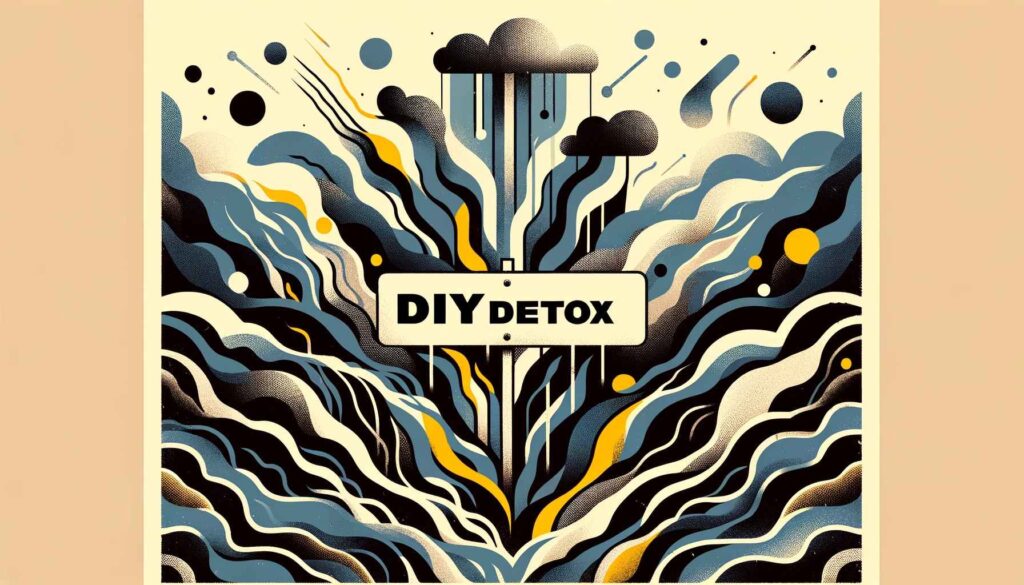Creating such an article requires a careful and responsible approach, emphasizing the risks involved and the necessity of medical supervision in many cases. The article’s goal would be to provide an informative guide that respects the autonomy of individuals considering self-detox, while also underscoring the importance of professional help.
What is Detoxification?

The initiation of recovery from substance use disorders marks a pivotal moment in an individual’s life, offering a path back to health and well-being. However, the journey is fraught with challenges, particularly during the initial detoxification phase.
Detoxification, or detox, is the first critical step in the recovery process, involving the elimination of toxic substances from the body. Its importance cannot be overstated, as it lays the groundwork for a successful rehabilitation and long-term recovery. During detox, individuals may experience withdrawal symptoms that can range from mildly uncomfortable to life-threatening, depending on the substance used, the duration of use, and the individual’s overall health.
This article targets individuals contemplating a self-managed detox for mild cases of substance dependence. It is essential to clarify that severe addictions, characterized by long-term, heavy use of substances, require a professional medical detox to ensure the safety and well-being of the person. The aim is to provide an informative guide for those considering self-detox, offering insights into the risks involved and emphasizing the value of professional help. Through understanding and preparation, individuals can make informed decisions about their path to recovery, prioritizing their health and safety above all.
Understanding Dependence and Withdrawal

Understanding substance dependence and withdrawal requires a deep dive into the physiological impacts of common substances such as alcohol, opioids, and stimulants, and how these substances alter the body’s natural state, leading to dependence and withdrawal symptoms upon cessation.
Of course, the states of dependence and withdrawal are not limited to these substances and classes, but I chose them as one of the most widespread for illustrative examples. More details can be found in the Withdrawal section.
Physiological Impact of Common Substances
- Alcohol: Chronic alcohol use affects the central nervous system, altering neurotransmitter activity. It depresses the central nervous system, leading to tolerance and physical dependence. The liver, which metabolizes alcohol, can also suffer significant damage from excessive consumption.
- Opioids: These substances bind to opioid receptors in the brain, producing pain relief and feelings of euphoria. Over time, the brain relies on these substances to stimulate pleasure pathways, leading to physical dependence. Opioids also affect the respiratory system, leading to decreased breathing rates.
- Stimulants (e.g., cocaine, methamphetamine, mephedrone): Stimulants increase dopamine levels in the brain, which enhances feelings of pleasure and alertness. Chronic use can disrupt the natural balance of neurotransmitters, leading to dependence as the brain becomes unable to produce normal levels of dopamine without the substance.
Body’s Response to Withdrawal
Dependence develops as the body adjusts to the presence of the substance and begins to require it to function normally. This adaptation manifests as tolerance, where higher doses of the substance are needed to achieve the same effects, and physical dependence, where the body exhibits withdrawal symptoms without the substance.
When an individual stops using the substance, the body, having adjusted to its presence, experiences a series of physiological and psychological reactions known as withdrawal symptoms. These symptoms occur as the body attempts to regain homeostasis.
Some Symptoms of Withdrawal
- Alcohol: Withdrawal can range from mild anxiety and tremors to severe complications like seizures and delirium tremens (DTs). Symptoms may include sweating, rapid heartbeat, nausea, insomnia, hallucinations, and agitation.
- Opioids: Withdrawal symptoms include muscle aches, restlessness, anxiety, tearing eyes, runny nose, excessive sweating, inability to sleep, and severe cravings. In severe cases, symptoms can escalate to abdominal cramping, diarrhea, dilated pupils, nausea, and vomiting.
- Stimulants: Withdrawal from stimulants primarily affects mood, with symptoms including depression, fatigue, changes in sleep patterns, increased appetite, agitation, and vivid, unpleasant dreams. Physical symptoms are less severe but can include restlessness and slowed movements.
Risks of DIY Detox

Assessing the risks associated with self-detox is a crucial step for individuals contemplating this route for substance withdrawal. While the desire for autonomy in the recovery process is understandable, recognizing and understanding the potential complications and risks of self-detoxification are essential for ensuring one’s safety and well-being.
Potential Complications and Risks of Self-Detox:
- Dehydration: Many substances, particularly alcohol and opioids, can lead to significant fluid loss during withdrawal, either through vomiting, diarrhea, or excessive sweating. Dehydration can rapidly worsen the individual’s condition and lead to more severe complications.
- Relapse: The discomfort and pain associated with withdrawal symptoms can make the process of self-detox incredibly challenging. Without the support and intervention offered in a supervised detox setting, the risk of relapse increases as individuals may turn back to substance use in an attempt to alleviate withdrawal symptoms.
- Severe Withdrawal Symptoms: Certain substances, especially alcohol and benzodiazepines, can lead to life-threatening withdrawal symptoms such as seizures and delirium tremens (DTs). DTs are characterized by confusion, rapid heartbeat, fever, and hallucinations. Without immediate medical intervention, these conditions can be fatal.
- Underlying Health Issues: Self-detox may not adequately address co-existing medical conditions that can be exacerbated by withdrawal, such as heart disease, diabetes, or mental health disorders. The absence of medical supervision can lead to the worsening of these conditions.
Assessing the Withdrawal Severity
Before considering self-detox, it is crucial to assess the severity of the addiction and the associated withdrawal risks. Factors to consider include:
- Duration and Quantity of Substance Use: Longer periods of use and higher amounts of substance consumption are associated with more severe withdrawal symptoms.
- Previous Withdrawal Experiences: Individuals who have undergone withdrawal before, particularly those who have experienced severe symptoms, are at a higher risk of complications during subsequent detox attempts.
- Co-occurring Medical and Mental Health Conditions: The presence of other health issues can complicate the withdrawal process and increase the risk of adverse outcomes.
- Substance Type: The type of substance used can significantly impact the risk profile of self-detox. For example, withdrawal from alcohol and benzodiazepines requires medical supervision due to the high risk of severe symptoms.
Preparing for Self-Detox: Steps and Considerations

Preparing for self-detox requires careful planning and consideration to ensure the process is as safe and effective as possible. In an ideal scenario, it is worth taking care of this issue in advance, so that when a cancellation occurs or after a decision on changes, you have a ready-made plan – this will make it clearer and easier to act, and the chances of success will increase.
Consulting with a Healthcare Professional: The most critical step is to consult with a healthcare professional. This step is crucial for assessing the risks associated with self-detox and obtaining advice tailored to your specific situation. A professional can offer insights into what you can expect during detox and provide recommendations for managing symptoms safely. If you have the opportunity to consult a specialist, do not ignore it and take advantage of it.
Building a Support System: Recovery is rarely a journey taken alone. Engage friends, family, or members of support groups who understand what you’re going through and are committed to helping you succeed. A robust support system can offer emotional encouragement, help monitor your progress, and assist in case of emergencies.
Creating a Safe, Comfortable Environment: A conducive environment is key to a more manageable detox process. Prepare a quiet, comfortable, and safe space where you can relax and rest without interruptions. Ensure you have access to a comfortable bed, a soothing atmosphere, and personal items that bring comfort and tranquility.
Hydration and Nutrition: Proper hydration and nutrition are vital during detox. Withdrawal often leads to loss of fluids and appetite, making it important to drink plenty of water, electrolyte solutions, or broth to stay hydrated. Focus on light, nutritious meals that are easy to digest. Foods rich in vitamins and minerals can help replenish the body and support the recovery process.
Managing Withdrawal Symptoms: Anticipate the types of withdrawal symptoms you might experience based on the substance and prepare accordingly. Simple comfort measures like warm baths, heating pads for muscle aches, and practices such as deep breathing can alleviate discomfort. Ensure a quiet environment to combat insomnia and restlessness.
Over-the-counter medications and Supplements: Certain over-the-counter medications and supplements can help ease withdrawal symptoms. For example, antidiarrheal medications, pain relievers like acetaminophen or ibuprofen, and vitamins and supplements (such as B vitamins) may be beneficial. However, it’s imperative to exercise caution and consult with a healthcare provider before using any medications or supplements, as some may interact adversely with withdrawal symptoms or existing health conditions.
In emphasizing these steps and considerations, the goal is to prepare individuals for the challenges of self-detox while highlighting the importance of doing so with caution and informed support. Self-detox can be a starting point for some on their journey to recovery.
Psychological and Emotional Support

The journey through detoxification is not solely a physical challenge but a profound psychological and emotional endeavor as well. The importance of mental health support during this period cannot be overstated, as it significantly influences the individual’s capacity to navigate withdrawal symptoms and fosters resilience against relapse. Integrating psychological and emotional support mechanisms can enhance the detox process, making recovery a more holistic experience.
Mindfulness and Relaxation Techniques:
- Deep Breathing Exercises: Simple deep breathing techniques can offer immediate relief during moments of anxiety or panic. Focusing on slow, deliberate breaths can help activate the body’s relaxation response, easing stress and promoting a sense of calm.
- Progressive Muscle Relaxation (PMR): PMR involves sequentially tensing and then relaxing different muscle groups in the body. This practice can reduce physical tension and stress, contributing to overall relaxation and comfort during detox.
- Mindfulness Meditation: Practicing mindfulness meditation can help manage stress, reduce anxiety, and improve emotional regulation. By focusing on the present moment and observing thoughts and feelings without judgment, individuals can gain a greater sense of calm and clarity.
Mental Health Support:
- Crisis Helplines: Having access to crisis helplines can be a lifeline during moments of acute distress or when facing the temptation to relapse. Organizations such as the National Suicide Prevention Lifeline (1-800-273-TALK) and the Substance Abuse and Mental Health Services Administration (SAMHSA) National Helpline (1-800-662-HELP) in the USA offer confidential support and can connect individuals with resources and treatment options.
- Support Groups: Participation in support groups, such as Alcoholics Anonymous (AA), Narcotics Anonymous (NA), or other recovery-focused communities, allows individuals to share their experiences, gain insights from peers who are also navigating the recovery process, and foster a sense of belonging and understanding. These groups can provide encouragement and motivation during challenging moments.
- Counseling: Engaging with a mental health professional can provide crucial support during detox. Counseling offers a safe space to explore the underlying issues contributing to substance use, develop coping strategies for dealing with stress and triggers, and plan for long-term recovery. Cognitive-behavioral therapy (CBT) and motivational interviewing (MI) are among the therapeutic approaches that can be particularly beneficial.
Incorporating psychological and emotional support into the detox process acknowledges the complex interplay between mind and body in recovery. By addressing mental health needs and leveraging supportive resources and techniques, individuals can navigate the challenges of detox with greater resilience and a stronger foundation for sustained recovery.
When to Seek Medical Help

Recognizing when to seek medical help is a critical aspect of the detoxification process, especially for self-detox. Certain signs and symptoms during withdrawal necessitate immediate medical intervention to ensure safety and well-being. Understanding these signs can make the difference between a challenging yet manageable detox experience and a potentially life-threatening situation.
Signs that Medical Intervention is Needed:
- Severe Withdrawal Symptoms: Symptoms such as seizures, severe confusion, hallucinations, extreme agitation, and delirium tremens (DTs) are dangerous and require immediate medical attention. These symptoms are more common in alcohol and benzodiazepine withdrawal but can occur with other substances as well.
- Suicidal Thoughts or Behaviors: Withdrawal can exacerbate or trigger mental health issues, including depression and anxiety, leading to suicidal ideation or attempts. Any signs of self-harm or thoughts of suicide are clear indicators that medical help is needed.
- Co-occurring Mental Health Disorders: Individuals with existing mental health conditions, such as major depression, bipolar disorder, or anxiety disorders, may find that detox exacerbates their symptoms. If you notice a significant worsening of mental health symptoms, it’s crucial to seek professional care.
- Inability to Retain Fluids or Food: Severe nausea, vomiting, or diarrhea that prevents the intake or retention of fluids can lead to dehydration and electrolyte imbalances, which are potentially life-threatening and require medical intervention.
- Uncontrollable Physical Symptoms: Tremors, intense sweating, heart palpitations, or chest pain can indicate severe physical distress. These symptoms can signal serious complications that necessitate immediate medical attention.
Erring on the Side of Caution:
It’s essential to err on the side of caution when experiencing withdrawal symptoms. If there’s any doubt about the severity of your condition or if you experience any of the above symptoms, seeking professional help is imperative. Withdrawal can be unpredictable, and what starts as a seemingly manageable process can quickly escalate into a medical emergency.
Encouraging Professional Help:
Encourage individuals undergoing detox, especially those attempting self-detox, to have a plan for accessing medical care quickly if needed. This could involve:
- Having a trusted person who is aware of the detox plan and can assist in seeking help if necessary.
- Knowing the location of the nearest hospital or emergency room and how to get there quickly.
- Having a list of emergency contacts, including healthcare providers familiar with the individual’s substance use history.
Alternatives to DIY Detox

When considering the detoxification process from substance use, it’s crucial to acknowledge that DIY methods carry inherent risks and limitations. For many individuals, medically supervised detox options provide a safer, more structured pathway to overcoming this state.
Medically Supervised Detox Options:
- Outpatient Services: Outpatient detox programs are suitable for individuals with mild to moderate substance dependence who do not require intensive supervision. These programs allow individuals to live at home while undergoing treatment, attending scheduled appointments for medical supervision, and support services. This option offers flexibility and is often less disruptive to daily life, making it a viable choice for those with work or family commitments.
- Inpatient Services: Inpatient, or residential, detox programs provide a higher level of care for individuals with severe dependence or those at risk of experiencing dangerous withdrawal symptoms. These services offer 24-hour medical supervision in a controlled environment, ensuring safety and access to immediate care if complications arise. Inpatient detox is particularly recommended for individuals detoxing from alcohol, benzodiazepines, opioids, and other substances associated with potentially life-threatening withdrawal symptoms.
Medication-Assisted Treatment (MAT):
- MAT is a highly effective approach for treating certain types of substance dependence, particularly opioid and alcohol dependence. This treatment combines the use of FDA-approved medications with counseling and behavioral therapies to treat the whole individual. Medications used in MAT for opioid dependence, such as methadone, buprenorphine, and naltrexone, work by reducing cravings and withdrawal symptoms without producing the euphoric high of the abused drug. For alcohol dependence, medications like disulfiram, naltrexone, and acamprosate may be used to reduce cravings and mitigate withdrawal symptoms.
Advantages of Professional Detox and MAT:
- Safety and Efficacy: Medically supervised detox and MAT provide a safer environment for managing withdrawal symptoms, reducing the risk of complications. The use of medications in MAT can significantly improve outcomes by managing withdrawal symptoms and reducing cravings, thereby lowering the risk of relapse.
- Comprehensive Care: These approaches offer more than just detoxification; they provide comprehensive care that addresses the psychological, social, and behavioral aspects of addiction. Counseling and behavioral therapies integrated into these programs support long-term recovery by helping individuals develop coping strategies, repair relationships, and make lifestyle changes conducive to sobriety.
- Individualized Treatment Plans: Professional detox and MAT programs tailor treatment to the individual’s needs, taking into account the severity of the addiction, the substance used, and any co-occurring mental health disorders. This personalized approach ensures that each individual receives the most effective treatment strategy for their situation.
Conclusion

Recovery, it must be emphasized, is a holistic process that extends far beyond the initial detox phase. It encompasses the healing of the mind as well as the body, requiring attention to mental health, the cultivation of supportive relationships, and, for many, ongoing medication management. Substance dependence is not merely a physical condition but one that deeply affects emotional well-being, interpersonal relationships, and overall quality of life. Therefore, a comprehensive approach to recovery that addresses all these facets is essential for lasting change.
Detox should be viewed not as a standalone solution but as the first step in a comprehensive plan for recovery. This initial phase clears the physiological reliance on substances, but the subsequent steps—ranging from therapy and counseling to support groups and possibly medication-assisted treatment (MAT)—are what truly allow individuals to rebuild their lives and sustain their sobriety. Recovery is a journey of transformation that requires patience, resilience, and commitment.
Let me encourage those contemplating or embarking on the path to recovery to seek out professional guidance and support. Whether through medically supervised detox, counseling, support groups, or other resources, it’s vital to remember that you are not alone. Many have walked this path before you, and with the right support and determination, recovery is within reach. Let detox be the beginning of a new chapter, one marked by health, fulfillment, and freedom from substance.
Find More
- Peter McDermott’s DIY Detox Guide
- The Definitive Opioid Withdrawal Survival Guide (Reddit)
- How to Do a Detox Cleanse At Home
- Alcoholics Anonymous (AA), Narcotics Anonymous (NA), SMART Recovery





Simply wish to say your article is as amazing!
I do not even know how I ended up here, but I thought this post was great! I do not know who you are, but certainly youre going to a famous blogger if you are not already. Cheers